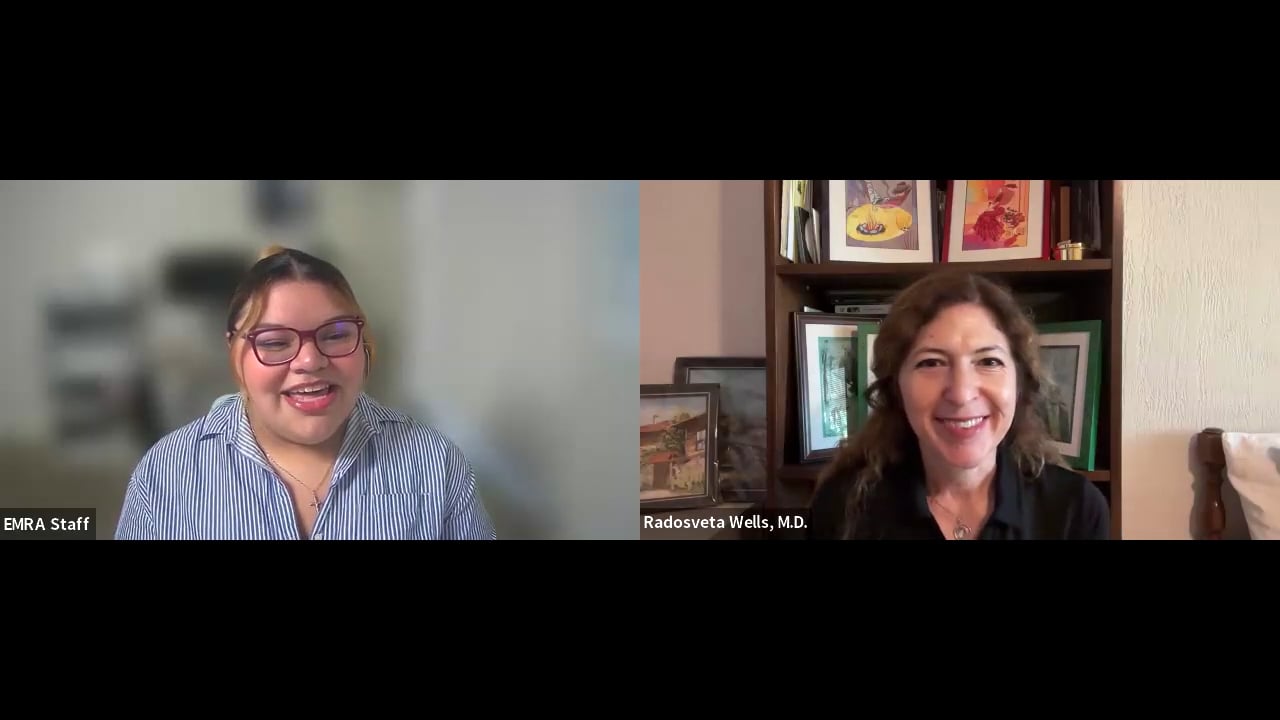Proposals, Politics, and Potatoes?: An Update from the Annual AMA House of Delegates
Ian Brodka, MS-IV, University of Rochester School of Medicine and Dentistry
EMRA MSC AMA-MSS Representative, 2022-23
Tyson Lumbreras, MS-III, Texas Tech University Health Sciences Center Paul L. Foster School of Medicine
EMRA MSC AMA-MSS Representative, 2022-23
After a long two years and four different AMA Meetings being conducted virtually, medical students from across the country celebrated being in person at the AMA 175th Anniversary meeting in Chicago to once again voice concerns within the House of Medicine. As students and future members of the medical profession, the AMA amplifies our collective voices based on what the membership body determines to be important and worth supporting. Since students are members with our own delegation, the Medical Student Section (MSS), we repeat a process of crafting and refining our arguments twice a year to address a wide variety of problems that we believe could and should be tackled by the AMA. After initial rounds of enthusiastic hugs for the return of in person meetings, the work before the MSS on deliberating final policy positions began.
Being the only section dedicated to those who have not yet graduated with a medical degree, and thus without the biases or experiences of seasoned physicians, the MSS tends to craft resolutions aimed at pressing social issues of the day or medical concerns that may be overlooked by others. As such, the MSS has been referred to by many variations of “the conscience of the AMA.” Resolutions this meeting placed before the MSS ranged anywhere from research to craft the “Perfect Potato” to increasing access to Naloxone to supporting reproductive healthcare to reinforcing and strengthening the AMA’s support against gun violence in all of its forms. Supporting resolutions at this level comes in the forms of personal testimonials, citing scientific studies, endorsements from other delegations, and only the finest of Avril Lavigne quotes.
Those resolutions that are adopted by the MSS may then be presented before the full House of Delegates at future AMA meetings, unless deemed timely and essential to current affairs. In which case, a resolution may be submitted for immediate advancement and consideration at the current meeting. In light of current events the past few months, including gun violence, threats to reproductive healthcare, and school discussions surrounding gender identity and sexual orientation, the MSS passionately put forward and supported a slew of resolutions that would allow the AMA to advocate on these issues at the state and national levels.
Advocating for Roe and Women’s Reproductive Health
When it came time to discuss reproductive healthcare policy, medical students stood at the podium to provide live testimony in support of protecting women's reproductive health rights. In a room full of physicians, residents and leaders within the AMA, the medical students' voices were well received and followed up with testimonies in support of the resolutions from respective organizations like American College of Obstetricians, and Gynecologists, and American Academy of Family Physicians. With the leaked decision of Dobbs v Jackson Women’s Health Organization potentially becoming official soon, maybe even between the time of writing this and time of publishing, this issue was of paramount importance. Arriving in Chicago on June 8th, the MSS knew that having their voice heard on protecting access to abortion and reproductive health was a top priority, and the MSS accomplished just that.
When it came time a few days later for the full House of Delegates to vote on accepting the resolution as official AMA policy, there was anticipation that a larger discussion would ensue concerning one specific line in the resolution. That line read, “That our AMA recognizes healthcare, including reproductive health services like contraception and abortion, are a human right.” This one clause would reaffirm the AMA’s existing stance that healthcare is a human right, but further expand on it as well to include reproductive services in that context. When the time came for further discussion, there was none. The House of Delegates passed this language, and other, more specific, supporting statements into official policy of the organization, meaning the AMA now will advocate at the state and federal levels to protect these services. Being present for that moment was extraordinary and one we won’t forget for a long, long time.
Achieving these goals is a lot of work, not only crafting these resolutions with eloquent arguments, thorough scientific studies, and organized effort from the whole of the MSS, but also discussions behind closed doors. Knowing whom to talk to is a massive task that is more than enough to make a first-timer's head spin. If Aaron Burr were to attend as a first-timer, he would certainly want to know how to “be in the room where it happens.” In the role of a member of the Section Council of Emergency Medicine, we are lucky to be granted access to at least one such room and allowed to give perspectives on matters before the Section. Much to our surprise as medical students, expressing opinions on the AMA President-elect candidates was exceptionally well received by everyone.
All of this to say, whether you’re a medical student, resident, or attending, your opinion and voice matters. We know that sometimes it may feel like you’re not making a difference in the lives of your patients or those around you, but everything you do is incredibly valuable. The AMA can be a powerful avenue to amplify your voice and be involved with advocacy at some of the highest levels within our profession. If you ever want to become more involved within the AMA, we are always here to facilitate that process for any of you. The addition of more voices and perspectives only strengthens our collective advocacy for change in an ever changing and evolving world. There may be stumbling blocks and failures that you encounter, but every now and then you get some massive wins like supporting reproductive health rights or greater gun violence advocacy. In the end, we think that makes the frustrations worth it.
Related Content


Feb 10, 2025
Interview with Mark Reiter, MD, MBA, MAAEM, UTHS-Murfreesboro/Nashville Emergency Medicine
In the latest installment of our PD Q&A series, we are highlighting the Emergency Medicine Residency Program at University of Tennessee Health Science-Murfreesboro/Nashville. We spoke with the current PD Dr. Mark Reiter about what makes their program unique and what they look for in potential residents.

May 26, 2023
PD Interview Saks at Crozer Chester
In the latest installment of our PD Q&A series, we are highlighting the Crozer Chester Medical Center Emergency Medicine Residency program. We spoke with the current PD Dr. Mark Saks, MD, about what makes his program unique and what he looks for in potential residents.




